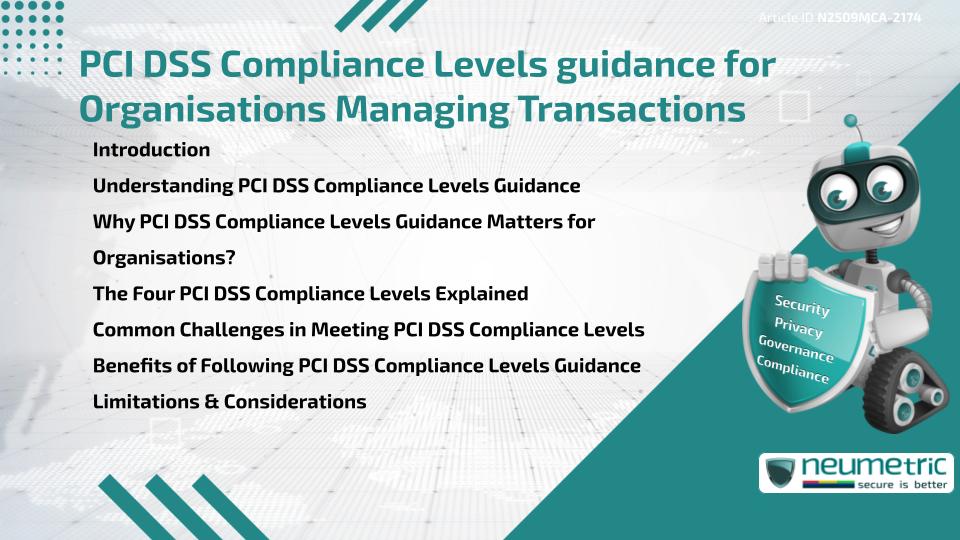Table of Contents
ToggleIntroduction
The PCI DSS Compliance Levels guidance provides organisations with a structured Framework to meet Security requirements based on Transaction volume. Developed by the Payment Card Industry Security Standards Council [PCI SSC], these Levels ensure businesses of all sizes follow appropriate measures to safeguard Cardholder Data. This article explains the Compliance Levels, their importance & how they benefit organisations managing Transactions.
Understanding PCI DSS Compliance Levels Guidance
Payment Card Industry Data Security Standard [PCI DSS] Compliance Levels classify organisations according to the number of Payment Card Transactions processed annually. The PCI DSS Compliance Levels guidance outlines validation requirements, from Self-assessment Questionnaires to Full Audits, depending on the Risk Level.
For official details, see the PCI Security Standards Council.
Why PCI DSS Compliance Levels Guidance Matters for Organisations?
Every organisation that Stores, Processes or Transmits Cardholder Data must comply with PCI DSS. The PCI DSS Compliance Levels guidance matters because it:
- Aligns Compliance obligations with Transaction Risk.
- Helps organisations prepare for appropriate Audits & Reporting.
- Reduces Risks of Data Breaches & Financial Fraud.
- Builds Customer & Partner trust through verified Security Practices.
The ISACA Compliance resources highlight PCI DSS as a key Framework for managing Payment Security.
The Four PCI DSS Compliance Levels Explained
- Level 1 – For organisations processing over six (6) million Annual Transactions. Requires an Annual onsite Audit by a Qualified Security Assessor [QSA] and Quarterly Scans.
- Level 2 – For organisations processing one (1) to six (6) million Transactions annually. Requires annual Self-assessment Questionnaire [SAQ] and sometimes a QSA Review.
- Level 3 – For organisations processing Twenty thousand (20,000) to one (1) million Annual Transactions online. Requires SAQ Validation & Quarterly Scans.
- Level 4 – For organisations processing fewer than Twenty thousand (20,000) e-commerce or up to one (1) million total Transactions annually. Requires SAQ & Vulnerability Scans.
For supporting guidance, see NCSC UK Payment Security resources.
Common Challenges in Meeting PCI DSS Compliance Levels
- Complexity of Requirements – Understanding which level applies can be confusing.
- Vendor Dependencies – Third Parties must also comply with PCI DSS.
- Resource Gaps – Smaller organisations may lack budget for Audits or Scans.
- Evolving Standards – PCI DSS v4.0 introduces new requirements that must be addressed.
For practical insights, see ENISA Payment Security guidelines.
Benefits of Following PCI DSS Compliance Levels Guidance
- Regulatory Assurance – Ensures adherence to Global Payment Card rules.
- Stronger Security Posture – Reduces exposure to Fraud & Breaches.
- Operational Clarity – Aligns Security investments with Transaction Risks.
- Customer Trust – Demonstrates commitment to safeguarding Financial Data.
Limitations & Considerations
The PCI DSS Compliance Levels guidance provides a foundation but does not eliminate Risks. Compliance must be maintained continuously through Regular Assessments, Employee Training & Vendor Oversight.
Takeaways
- The PCI DSS Compliance Levels guidance categorises organisations by Transaction Volume into four Levels.
- Level 1 requires the most rigorous Audits, while Level 4 focuses on smaller businesses.
- Following the guidance ensures Compliance, stronger Security & Customer confidence.
FAQ
What is the PCI DSS Compliance Levels guidance?
It is a Framework that classifies organisations by Transaction Volume & Defines Compliance validation requirements.
How many Compliance Levels exist?
There are four Levels, ranging from Level 1 for the largest merchants to Level 4 for smaller businesses.
Who needs PCI DSS Compliance?
Any organisation that processes, stores or transmits Cardholder Data.
Does Compliance guarantee Security?
No, but it establishes a strong baseline for protecting Payment Data.
How often must Compliance be validated?
Typically annually, with Quarterly Scans for certain Levels.
References
- PCI Security Standards Council
- ISACA – Compliance Resources
- NCSC UK – Payment Security Guidance
- ENISA – Payment Security Guidelines
- IT Governance – PCI DSS Resources
Need help for Security, Privacy, Governance & VAPT?
Neumetric provides organisations the necessary help to achieve their CyberSecurity, Compliance, Governance, Privacy, Certifications & Pentesting needs.
Organisations & Businesses, specifically those which provide SaaS & AI Solutions in the Fintech, BFSI & other regulated sectors, usually need a CyberSecurity Partner for meeting & maintaining the ongoing Security & Privacy needs & requirements of their Enterprise Clients & Privacy conscious Customers.
SOC 2, ISO 27001, ISO 42001, NIST, HIPAA, HECVAT, EU GDPR are some of the Frameworks that are served by Fusion – a SaaS, multimodular, multitenant, centralised, automated, CyberSecurity & Compliance Management system.
Neumetric also provides Expert Services for technical Security which covers VAPT for Web Applications, APIs, iOS & Android Mobile Apps, Security Testing for AWS & other Cloud Environments & Cloud Infrastructure & other similar scopes.
Reach out to us by Email or filling out the Contact Form…


